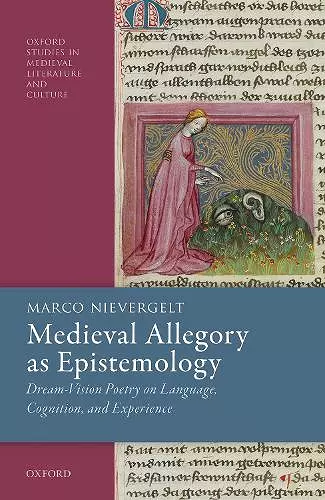Medieval Allegory as Epistemology
Dream-Vision Poetry on Language, Cognition, and Experience
Format:Hardback
Publisher:Oxford University Press
Published:13th Apr '23
Currently unavailable, and unfortunately no date known when it will be back

In Medieval Allegory as Epistemology, Marco Nievergelt argues that late medieval dream-poetry was able to use the tools of allegorical fiction to explore a set of complex philosophical questions regarding the nature of human knowledge. The focus is on three of the most widely read and influential poems of the later Middle Ages: Jean de Meun's Roman de la Rose; the Pélerinages trilogy of Guillaume de Deguileville; and William Langland's vision of Piers Plowman in its various versions. All three poets grapple with a collection of shared, closely related epistemological problems that emerged in Western Europe during the thirteenth century, in the wake of the reception of the complete body of Aristotle's works on logic and the natural sciences. This study therefore not only examines the intertextual and literary-historical relations linking the work of the three poets, but takes their shared interest in cognition and epistemology as a starting point to assess their wider cultural and intellectual significance in the context of broader developments in late medieval philosophy of mind, knowledge, and language. Vernacular literature more broadly played an extremely important role in lending an enlarged cultural resonance to philosophical ideas developed by scholastic thinkers, but it is also shown that allegorical narrative could prompt philosophical speculation on its own terms, deliberately interrogating the dominance and authority of scholastic discourses and institutions by using first-person fictional narrative as a tool for intellectual speculation.
Nievergelt's book is long, challenging, and deeplyrewarding. Whatever position readers might take on the many arresting arguments advanced here, anyone who reads Medieval Allegory as Epistemologycannot fail to be convinced of the intellectual richness of the Rose, the dynamism and interest of Deguileville's writing, and the huge importance of these works for understanding the cultural landscape that Langland inhabited. * Philip Knox, The Yearbook of LanglandStudies *
Through a poetics of exhaustion in which the self is paradoxically affirmed and unmade, Langland is seen to demonstrate the salvific inadequacy of his own work and of the epistemological allegory whose anxiously self-conscious tradition is examined in such detail by Nievergelt's fascinating, subtle, and wide-ranging study. Beyond its learned and nuanced readings of individual poems and of passages within those poems, Medieval Allegory as Epistemology demonstrates the importance and value of reading the Roman de la Rose, Deguileville's pilgrimage trilogy, and Langland's three versions of Piers Plowman against one another as part of the same poetic tradition that pushes up against the limits of the thinkable. * Jonathan Morton, Speculum: A Journal of Medieval Studies *
ISBN: 9780192849212
Dimensions: 241mm x 160mm x 36mm
Weight: 980g
572 pages